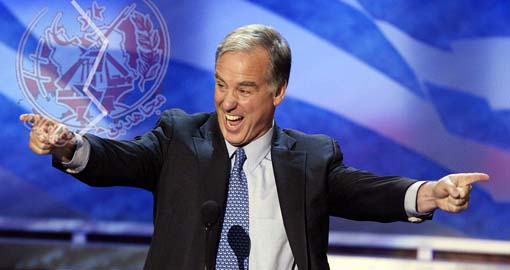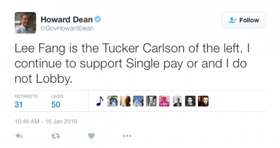Last week, we reported that Howard Dean, former presidential candidate and current supporter of Hillary Clinton’s presidential campaign, had attacked Bernie Sanders for supporting a single-payer health plan, claiming that having the government pay for everyone’s health care would “undo people’s health care” and result in “chaos.” In our story, we noted that Dean, once a proponent of single-payer, now works for the lobbying practice of Dentons, a law firm retained to lobby on behalf of a number of pharmaceutical and for-profit health care interests.

In response, Dean tweeted: “I continue to support Single pay or [sic] and I do not Lobby.”

He tweeted the next day: “The Intercept=The Daily Caller of the left. Same propaganda techniques.”
Dean did not respond to multiple requests for comment. Dentons’ director of communications, Bennett Kleinberg, wrote to us to say, “Howard Dean is a senior advisor with Dentons in our Public Policy and Regulation practice. However, he is not a registered lobbyist and does not lobby public officials on behalf of clients of the Firm.”
Since joining the lobbying industry, Dean has oddly argued on multiple occasions that he does “not lobby.” But he engages in virtually every lobbying activity imaginable, helping corporate interests reach out to lawmakers on legislation, advising them on political strategy, and using his credibility as a former liberal lion to build public support on behalf of his lobby firm clients.
In his new career, he has helped drug companies maintain monopoly power, reversed his old positions on Medicare prices, and worked to undermine a critical component of the Affordable Care Act. Though known for his anti-war rhetoric in 2004, Dean has accepted money from Mojahedin-e Khalq, an extremist group seeking regime change in Iran and has criticized President Obama’s negotiations with Iran.
The fact that Dean is not a registered lobbyist reflects a distinction that is largely meaningless in today’s Washington. Thousands of other professionals in the lobbying business have either never registered or de-registered and lobby registration law has almost never been enforced. Newt Gingrich, who was widely criticized in 2011 for acting as a lobbyist for various clients without registering, was hired last year by Dentons’ lobbying practice, where he works closely with Dean to consult with clients on political strategy. As Legal Times reported, the Dean-Gingrich team is now a selling point for Dentons as the “pair aims to become another Washington-based bipartisan tag team who can act as political soothsayers for whichever corporate clients call upon them.”
Helping keep drugs expensive
In 2009, Dean joined the lobbying division of the law firm McKenna Long & Aldridge LLP, which represents a number of health care interests. Through the firm, he was retained that year to work for Biotechnology Industry Organization, or BIO, a lobbying group for biotech and pharmaceutical companies.
After being retained by BIO, Dean authored an opinion column for The Hill newspaper arguing in support of a bill backed by his client that called for extending the exclusivity period for drugs made from living organisms, such as vaccines or Herceptin/trastuzumab, a treatment for breast cancer.
Dean claimed in the piece that a “commonsense and fair approach, similar to the process and timeline currently in place for generic versions of chemical-based medicines, would allow the original developer of the biologic to protect the proprietary data used to develop the medicine for at least 12 years.”
Dean’s call for extending the exclusivity period for biologics — a move that would boost prices for life-saving drugs — shocked patient and consumer advocates. Dean did not initially disclose that he was working for BIO in his column, although The Hill later updated his byline to note that Dean’s law firm represented biotech companies.
The inside story of Dean’s work for the biotech lobby was revealed in an article by BioCentury, a trade publication. According to the report, Dean and his former campaign manager Joe Trippi were hired by BIO to help move forward the biologic legislation backed by the industry. Jim Greenwood, the president of BIO, told BioCentury that Dean was brought on to help with messaging, strategy, and even to contact lawmakers on Capitol Hill on behalf of the industry. BIO made clear that Dean was hired specifically for his reputation as a liberal. “As a physician clearly focused on health care, a Democrat leader and clearly to left of center, his efforts were impactful,” Greenwood said.
Dean defended his efforts to BioCentury by saying, “I do not lobby.”
In the end, a version of the biologic legislation was folded into the Affordable Care Act.
“Howard Dean navigated around the lobbying rules to push Democrats to back big drug companies on the term of the monopoly for biologic drugs,” said Jamie Love, the director of Knowledge Ecology International, a nonprofit organization that addresses human rights aspects of intellectual property rights and medical innovation. “His ‘trust me, I’m a doctor’ routine was worth billions to Roche and the other companies he represented on this. Now it is very hard to undo the damage.”

Screen grab of Dentons’ website with Howard Dean’s bio.
Photo: Dentons.com
Bashing PhRMA, then parroting it
On the 2004 campaign trail, Dean criticized the role of health care lobbyists in setting prescription drug policies, such as the deal engineered by drug companies that prevents Medicare from using its bargaining power as the Veterans Administration does to negotiate for lower drug prices. Such a change would save over $116 billion over 10 years. Dean told the Associated Press: “As president, a high and early legislative priority of my new administration would be to improve the prescription drug benefit to create one that is affordable, federally administered, and for all of America’s seniors; uses the government’s buying power on behalf of 41 million seniors to negotiate and drive down drug prices; contains meaningful cost containment including reimportation of safe, effective medicines.”
But Dean, whose new employer, Dentons, represents the Pharmaceutical Research and Manufacturers of America, the powerful drug lobby group known as PhRMA, has now changed his tune. During a discussion with Gingrich last year, Dean reversed his position and said he is now against allowing Medicare to bargain for lower drug prices. Dean told the audience that some expensive drugs, like those used to treat hepatitis C, could eventually save money long term, a claim Inside Health Policy noted closely echoed drugmakers’ arguments.
In September of last year, Dean took his newfound love of drug companies to the pages of the New York Times. In a letter to the editor opposing an op-ed that proposed to allow Medicare to bargain for cheaper prices, Dean wrote that “schemes to launch a federal attack on one of the last growing, innovative industries in America are in the long run counterproductive for both job creation and, more important, for the health of human beings around the world.”
Working to undermine Obamacare
In 2013, Dean again surprised health care advocates by publishing a Wall Street Journal opinion column criticizing a key component of the Affordable Care Act: the Independent Payment Advisory Board, also known as IPAB. The board is designed to allow a group of experts to make recommendations on how Medicare can save money, but only in ways that do not reduce benefits and low-income subsidies or raise premiums. Dean, repeating GOP arguments against the board, called IPAB “essentially a health-care rationing body,” and he said it should be repealed.
Health policy experts reacted furiously. The New Republic writer Jonathan Cohn noted that it was quite puzzling that Dean, supposedly a supporter of government programs designed to use evidence-based approaches to set provider payment rates, would suddenly decide to oppose IPAB. “Or maybe it’s not so strange to hear Dean say this,” Cohn wrote. “Since his career in politics ended, Dean has found a home in the K Street establishment he once held in such disdain.”
“Shame on Howard Dean,” wrote economist J. Bradford DeLong, who noted that it appears as though Dean was “being mendacious to try to protect the profits of the clients of McKenna Long & Aldridge.”
Dean conceded to Time that his firm has clients that oppose IPAB, but refused to disclose them.
And in December 2009, as the Affordable Care Act nearly died as conservative opposition grew to a fever pitch and Democratic leaders struggled to find enough votes to move it forward, Dean appeared on national network news programs to call for President Obama to scrap the legislation and start over, a process that would have doomed any chance for health care reform.
Paid by Iranian extremist group, bashing Iran negotiations
The Mojahedin-e Khalq, an exiled Iranian group that has attempted for years to overthrow the government of Iran, paid Dean to help in its campaign to be delisted as a U.S.-recognized terrorist group. In 2011, the Wall Street Journal reported that Dean was receiving speaking fees from the group. Around that time, Dean began vociferously arguing on behalf of the MEK, even though he conceded that he had known little about the group before joining its cause.
That year, Dean traveled along with other paid MEK supporters, including Rudy Giuliani, to appear in Berlin with the group and demand that Western nations recognize the MEK leader Maryam Rajavi as the president of Iran. In addition to carrying out a campaign of terrorism against Iran, the MEK helped Saddam Hussein after the Gulf War crush rebellions in Iraq’s Shiite and Kurdish communities. “Take the Kurds under your tanks, and save your bullets for the Iranian Revolutionary Guards,” Rajavi once said.
In 2014, Dean came out against President Obama’s policy of engagement with Iran, declaring that the U.S. negotiations failed to account for the interests of the MEK. (Dean even spoke on Capitol Hill on behalf of an MEK-affiliated group, which posted the video online.) Last year, Dean continued to advocate against a nuclear accord with Iran, calling Secretary of State John Kerry and Obama “far, far too eager for a deal with Iran.”
Dean’s success on the other side of the revolving door rests in part on his credibility as a left-wing icon. And yet, despite his fiery rhetoric on the campaign trail in 2003, Dean by most accounts governed Vermont as a business-friendly, moderate Democrat. Even his record on single-payer is far less supportive than what he has attempted to project.
In 1991, as the lieutenant governor of Vermont, Dean testified in support of single-payer. But as governor, he quickly backtracked, claiming that single-payer would be too expensive for the state.
John McClaughry, Dean’s Republican opponent for governor during the 1991 election, recalls that Dean continually shifted the goal posts for single-payer. “I don’t know that Howard has any fixed principles about this issue — it’s what sells at the moment,” McClaughry said.
Dean’s evolution as a politician is discussed at length during the first Huffington Post podcast Candidate Confessional. During the interview, Dean explains that he knew well before the infamous post-Iowa caucus scream that he had little chance of becoming president as an insurrectionist populist. He yearned to be regarded as a serious, establishment-friendly politician, but was too slow in making the transition as a candidate.
“I couldn’t make the turn to become an establishment candidate,” he lamented.
Contact the author:
Lee Fang, the intercept

